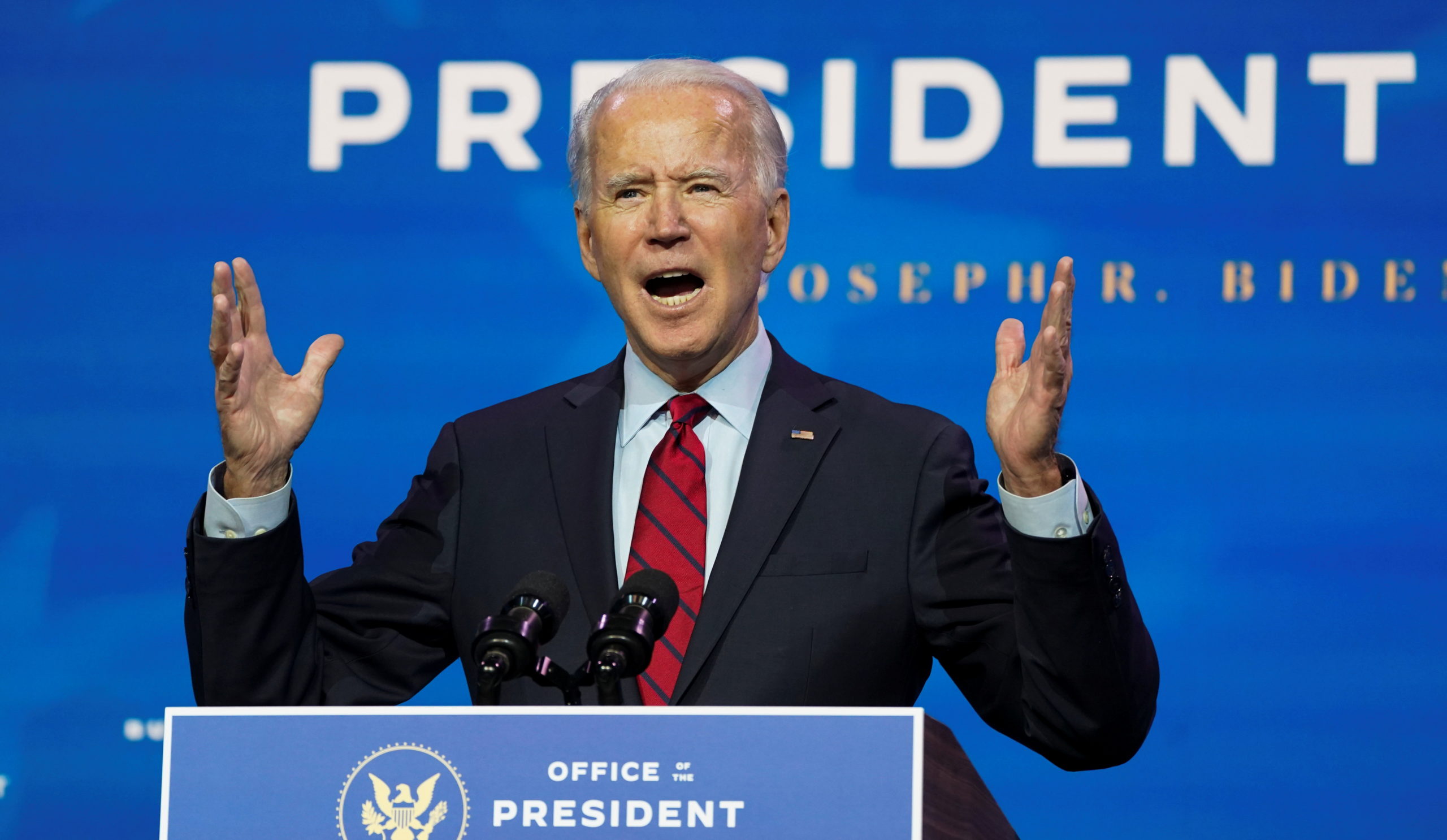US Electoral College close to formally confirming Joe Biden’s win

U.S. President-elect Joe Biden announces nominees and appointees to serve on his health and coronavirus response teams during a news conference at his transition headquarters in Wilmington, Delaware, U.S., December 8, 2020. (Reuters)
LANSING, Michigan–Presidential electors across the United States formally voted for Democrat Joe Biden on Monday despite President Donald Trump’s pressure on several states to declare him the winner, all but ending his long-shot campaign to overturn the results of the Nov. 3 election.
Members of the Electoral College in Arizona, Georgia, Michigan, Nevada, Pennsylvania and Wisconsin — all swing states in which Trump allies unsuccessfully challenged Biden’s victories in court — cast the states’ electoral votes for the former vice president.
Traditionally a formality, the Electoral College vote – set for Monday by federal law – assumed outsized significance because of Trump’s unsubstantiated claims of widespread fraud in November’s contest.
Results for weeks have shown Biden won 306 Electoral College votes – exceeding the 270 needed to win – after four tumultuous years under the Republican Trump. Biden and running mate Kamala Harris are due to take office on Jan. 20.
Biden planned a prime-time address at 7:30 p.m. ET on Monday (0030 GMT on Tuesday) to mark the occasion and call on Americans to “turn the page” on the Trump era.
Article continues after this advertisement“The flame of democracy was lit in this nation a long time ago,” he was expected to say, according to excerpts released by his transition team. “And we now know that nothing — not even a pandemic — or an abuse of power — can extinguish that flame.
Article continues after this advertisement“In this battle for the soul of America, democracy prevailed.”
There was next to no chance that Monday’s voting would negate Biden’s victory and, with Trump’s legal campaign to reverse the results floundering, the president’s dim hopes of clinging to power rest with persuading Congress not to accept Monday’s electoral vote during a Jan. 6 special session – an effort that is virtually certain to fail.
California, the most populous U.S. state, was expected to formally push Biden over the 270 Electoral College votes needed to win overall after its electors meet at 5 p.m. ET (2200 GMT).
Once in office, Biden faces the challenging task of fighting the coronavirus pandemic, reviving the U.S. economy and rebuilding relations frayed with U.S. allies abroad by Trump’s “America First” policies.
THREATS OF VIOLENCE
In Arizona, at the beginning of the electors’ meeting there, the state’s Democratic secretary of state, Katie Hobbs, said Trump’s claims of fraud had “led to threats of violence against me, my office, and those in this room today,” echoing similar reports of threats and intimidation in other states.
“While there will be those who are upset their candidate didn’t win, it is patently un-American and unacceptable that today’s event should be anything less than an honored tradition held with pride and in celebration,” Hobbs said.
A group of Trump supporters called on Facebook for protests all day on Monday outside the state Capitol in Lansing, Michigan, one of the hardest-fought states where Trump lost.
But by early afternoon only a handful had gathered, including Bob Ray, 66, a retired construction worker. He held a sign that read: “order a forensic audit,” “save America” and “stop communism.”
Under a complicated system dating back to the 1780s, a candidate becomes U.S. president not by winning a majority of the popular vote but through the Electoral College system, which allots electoral votes to the 50 states and the District of Columbia largely based on the size of their population.
(Here’s a graphic on how the Electoral College works: https://tmsnrt.rs/3lUKcgv)
Electors are typically party loyalists who represent the winning candidate in their state, with the exception of Maine and Nebraska, which allocate some of their Electoral College votes based on which candidate won each of the states’ congressional districts.
While there are sometimes a handful of “rogue” electors who vote for someone other than the winner of their state’s popular vote, the vast majority rubber-stamp the results.
Trump said late last month he would leave the White House if the Electoral College voted for Biden, but has since pressed on with his unprecedented campaign to overturn his defeat. On Monday, he repeated a series of unsupported claims of electoral fraud.
“Swing States that have found massive VOTER FRAUD, which is all of them, CANNOT LEGALLY CERTIFY these votes as complete & correct without committing a severely punishable crime,” he wrote on Twitter.
TRUMP’S GAMBIT
Trump had called on Republican state legislators to appoint their own electors, essentially ignoring the will of the voters, but lawmakers largely dismissed the idea.
“I fought hard for President Trump. Nobody wanted him to win more than me,” Lee Chatfield, Republican speaker of the Michigan House of Representatives, said in a statement. “But I love our republic, too. I can’t fathom risking our norms, traditions and institutions to pass a resolution retroactively changing the electors for Trump.”
Once the Electoral College vote is complete, Trump’s sole remaining gambit would be to persuade Congress not to certify the count on Jan. 6.
Any attempt to block a state’s results, and thus change the overall U.S. tally, must earn majority approval from both chambers of Congress that day. Democrats control the House of Representatives, while enough Republicans in the Senate have acknowledged Biden’s victory to ensure any challenge would likely fail.
In 2016, Trump won the Electoral College despite losing the popular vote to Democrat Hillary Clinton by nearly 3 million votes. The formal vote earned extra attention when some Democratic activists called for electors to “go rogue” against Trump. In the end, seven electors broke ranks, an unusually high number but still far too few to sway the outcome.